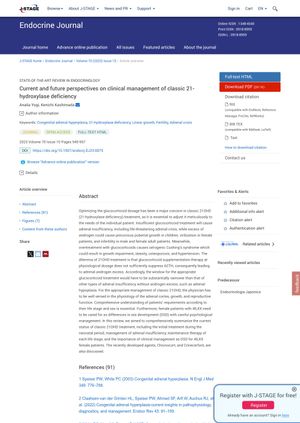TLDR Treating classic 21-hydroxylase deficiency requires precise glucocorticoid dosing and attention to individual patient needs, with new treatments showing promise.
The document discusses the challenges and considerations in treating classic 21-hydroxylase deficiency (21OHD), a condition that requires careful glucocorticoid dosage management. Insufficient treatment can lead to adrenal insufficiency and potentially life-threatening adrenal crisis, while excess can cause issues like precocious pubertal growth, virilization, infertility, and iatrogenic Cushing’s syndrome. The treatment dilemma lies in the fact that physiological dosage glucocorticoid supplementation doesn't sufficiently suppress ACTH, leading to adrenal androgen excess. Therefore, the window for appropriate treatment is narrower than other types of adrenal insufficiency. Proper management requires a comprehensive understanding of the patient's needs according to their life stage and sex, with special attention needed for 46,XX female patients who need to be managed as differences in sex development (DSD). The document also mentions the potential of recently developed agents, Chronocort and Crinecerfont, in the treatment of 21OHD.
 157 citations
,
May 2021 in “Endocrine Reviews”
157 citations
,
May 2021 in “Endocrine Reviews” Early diagnosis and individualized treatment improve outcomes for Congenital Adrenal Hyperplasia.
 11 citations
,
August 2019 in “The Journal of Sexual Medicine”
11 citations
,
August 2019 in “The Journal of Sexual Medicine” Women with nonclassic congenital adrenal hyperplasia experience more sexual dysfunction and distress.
 22 citations
,
January 2019 in “Endocrinology and metabolism”
22 citations
,
January 2019 in “Endocrinology and metabolism” An mFG score of 7 or higher indicates hirsutism in Filipino women, often linked to higher free testosterone levels.
 378 citations
,
November 2011 in “Human reproduction update”
378 citations
,
November 2011 in “Human reproduction update” Experts recommend using evidence-based methods to diagnose and treat hirsutism, focusing on symptoms and underlying causes.
 117 citations
,
May 2017 in “Human Reproduction Update”
117 citations
,
May 2017 in “Human Reproduction Update” The update highlights that non-classic congenital adrenal hyperplasia is common in women with excess male hormones, requires specific hormone tests for diagnosis, and has various treatment options depending on age and symptoms.
 August 2022 in “IntechOpen eBooks”
August 2022 in “IntechOpen eBooks” Congenital Adrenal Hyperplasia is a rare inherited disease causing hormone imbalances, affecting growth, fertility, and heart health, diagnosed through blood tests and treated with medication and lifestyle changes.
 62 citations
,
March 2011 in “European journal of endocrinology”
62 citations
,
March 2011 in “European journal of endocrinology” Some parents have a mild form of congenital adrenal hyperplasia without symptoms, and they usually don't need treatment.
 4 citations
,
December 2022 in “Frontiers in Endocrinology”
4 citations
,
December 2022 in “Frontiers in Endocrinology” Treating non-classic congenital adrenal hyperplasia is complex because the benefits of hormone treatment must be weighed against potential health risks.
 30 citations
,
June 2019 in “Frontiers in Endocrinology”
30 citations
,
June 2019 in “Frontiers in Endocrinology” The document concludes that managing non-classical congenital adrenal hyperplasia in females requires personalized treatment, genetic counseling, and a team of specialists.









